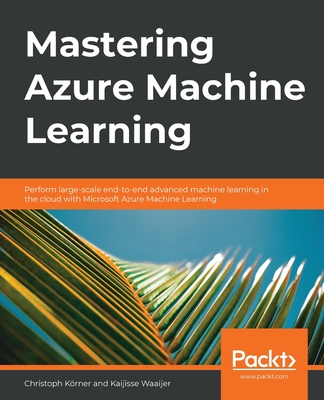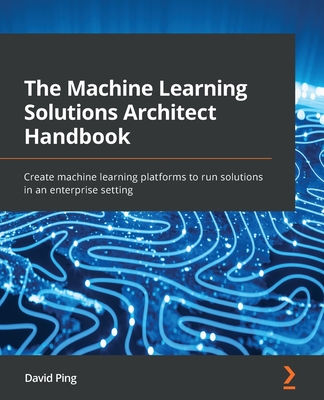Machine Learning Engineering with Python - Second Edition: Manage the lifecycle of machine learning models using MLOps with practical examples
McMahon, Andrew
- 出版商: Packt Publishing
- 出版日期: 2023-08-31
- 售價: $1,870
- 貴賓價: 9.5 折 $1,777
- 語言: 英文
- 頁數: 462
- 裝訂: Quality Paper - also called trade paper
- ISBN: 1837631964
- ISBN-13: 9781837631964
-
相關分類:
Python、程式語言、Machine Learning
立即出貨 (庫存=1)
買這商品的人也買了...
-
 機器學習的算法分析和實踐
機器學習的算法分析和實踐$354$336
商品描述
Transform your machine learning projects into successful deployments with this practical guide on how to build and scale solutions that solve real-world problems
Includes a new chapter on generative AI and large language models (LLMs) and building a pipeline that leverages LLMs using LangChain
Key Features:
- This second edition delves deeper into key machine learning topics, CI/CD, and system design
- Explore core MLOps practices, such as model management and performance monitoring
- Build end-to-end examples of deployable ML microservices and pipelines using AWS and open-source tools
Book Description:
Machine Learning Engineering with Python, 2nd Edition, is the practical guide that MLOps and ML engineers need to build robust solutions to solve real-world problems, providing you with the skills and knowledge you need to stay ahead in this rapidly evolving field.
The book takes a hands-on, examples-focused approach providing essential technical concepts, implementation patterns, and development methodologies. You'll go from understanding the key steps of the machine learning development lifecycle to building and deploying robust machine learning solutions. Once you've mastered the basics, you'll get hands-on with deployment architectures and discover methods for scaling up your solutions.
This edition goes deeper into ML engineering and MLOps, with a sharper focus on ML. You'll take CI/CD further with continuous training and testing and go in-depth into data and concept drift.
With a new generative AI chapter, explore Hugging Face, PyTorch, and GitHub Copilot, and consume an LLM via an API using LangChain. You'll also cover deep learning considerations regarding workflow, hardware, and scaling up workloads, as well as orchestrating workflows with Airlfow and Kafka. And take advantage of ZenML as an open-source option for pipelining dataflows, and take deployment further with canary, blue, and green deployments.
What You Will Learn:
- Plan and manage stages of machine learning development projects
- Explore ANNs, DNNs, and LLMs, and get to grips with the rise of generative AI in MLOps
- Use Python to package your own ML tools and scale up solutions with Apache Spark, Kubernetes, and Apache Airflow
- Use AutoML for hyperparameter tuning
- Detect drift and build robust mechanisms into your solutions
- Supercharge your error handling with robust control flows and vulnerability scanning
- Host and build an ML microservice using AWS and Flask
Who this book is for:
This book is designed for MLOps and ML engineers, data scientists, and software developers who want to build robust solutions that use machine learning to solve real-world problems. If you're not a developer but want to manage or understand the product lifecycle of these systems, you'll also find this book useful. It assumes a basic knowledge of machine learning concepts and intermediate programming experience in Python. With its focus on practical skills and real-world examples, this book is an essential resource for anyone looking to advance their machine learning engineering career.
商品描述(中文翻譯)
將您提供的文字翻譯成繁體中文如下:
將您的機器學習專案轉化為成功部署的實用指南,教您如何建立和擴展解決現實世界問題的解決方案。
新增了一章關於生成式人工智慧和大型語言模型(LLMs),以及使用LangChain利用LLMs建立流程的內容。
主要特點:
- 本書第二版更深入探討關鍵的機器學習主題、CI/CD和系統設計。
- 探索核心的MLOps實踐,如模型管理和性能監控。
- 使用AWS和開源工具構建可部署的機器學習微服務和流程的端到端示例。
書籍描述:
《Python機器學習工程》第二版是MLOps和機器學習工程師在解決現實世界問題時所需的實用指南,為您提供在這個快速發展的領域中保持領先所需的技能和知識。
本書以實例為重,提供必要的技術概念、實現模式和開發方法論。您將從了解機器學習開發生命周期的關鍵步驟開始,進而建立並部署強大的機器學習解決方案。一旦掌握了基礎知識,您將深入研究部署架構,並發現擴展解決方案的方法。
本版更深入探討了機器學習工程和MLOps,更加關注機器學習。您將進一步進行持續訓練和測試,並深入研究數據和概念漂移。
在新增的生成式人工智慧章節中,探索Hugging Face、PyTorch和GitHub Copilot,並使用LangChain通過API使用LLM。您還將涵蓋有關工作流程、硬件和擴展工作負載的深度學習考慮因素,以及使用Airlfow和Kafka編排工作流程。並利用ZenML作為管道數據流的開源選項,並通過金絲雀、藍綠部署進一步進行部署。
學到什麼:
- 計劃和管理機器學習開發項目的各個階段。
- 探索人工神經網絡(ANNs)、深度神經網絡(DNNs)和大型語言模型(LLMs),並了解MLOps中生成式人工智慧的崛起。
- 使用Python打包自己的機器學習工具,並使用Apache Spark、Kubernetes和Apache Airflow擴展解決方案。
- 使用AutoML進行超參數調整。
- 檢測漂移並在解決方案中建立強大的機制。
- 通過強大的控制流程和漏洞掃描來增強錯誤處理。
- 使用AWS和Flask來托管和構建機器學習微服務。
適合閱讀對象:
本書適合MLOps和機器學習工程師、數據科學家和軟件開發人員,他們希望構建使用機器學習解決現實世界問題的強大解決方案。如果您不是開發人員,但希望管理或了解這些系統的產品生命周期,您也會發現本書很有用。本書假設讀者對機器學習概念有基本了解,並具有Python的中級編程經驗。由於其專注於實用技能和現實世界示例,本書是任何希望提升機器學習工程職業生涯的人的重要資源。










